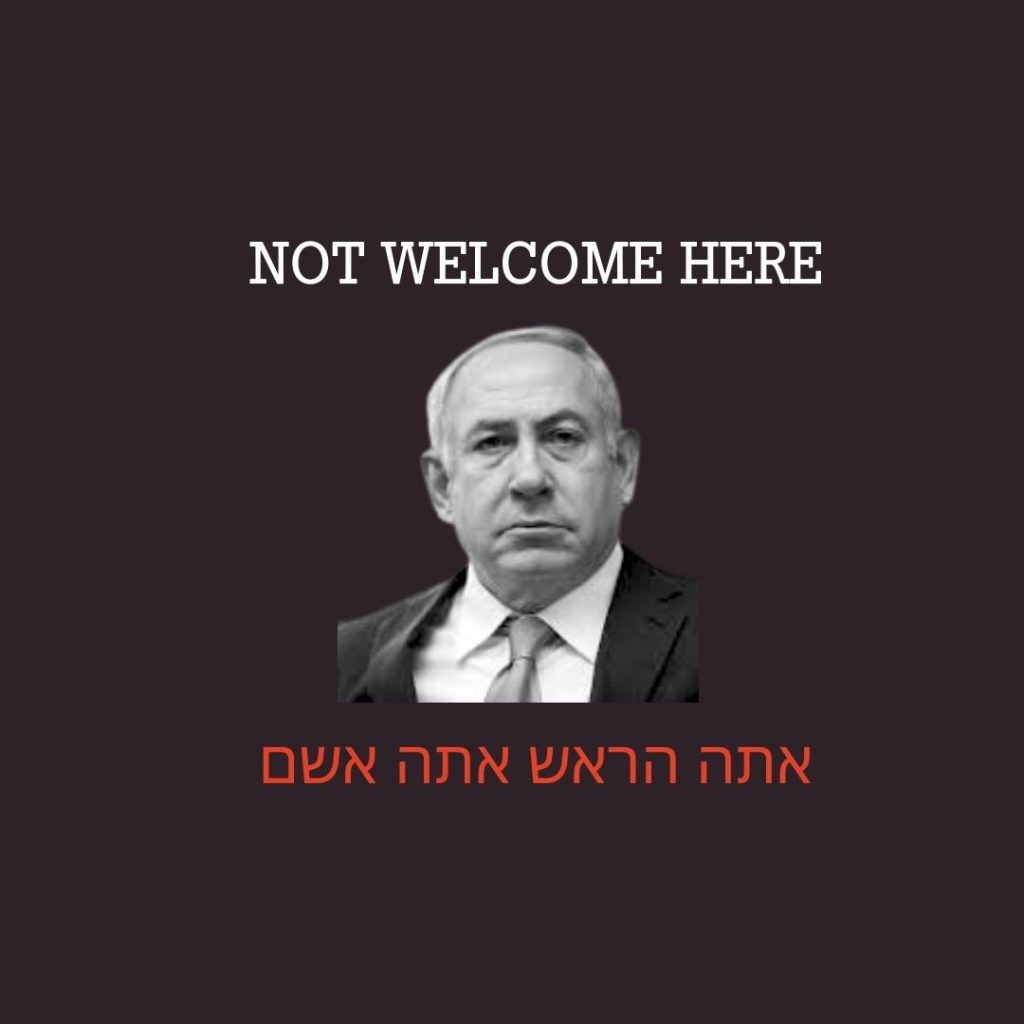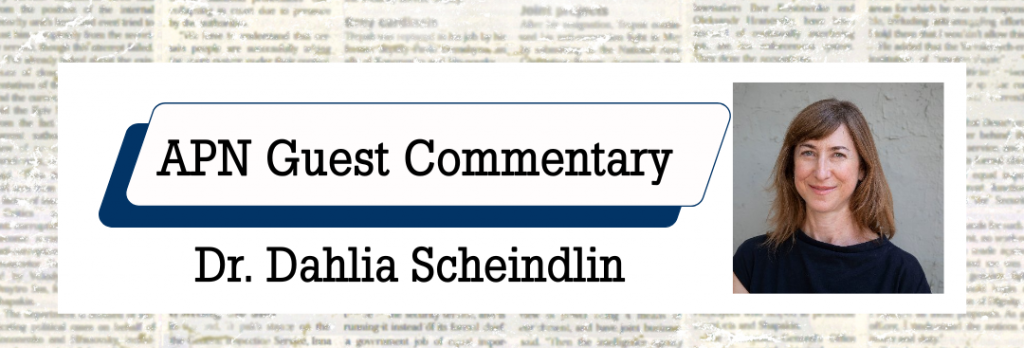To (un)welcome Netanyahu during his visit to Washington next week and in solidarity with the Israeli protest movement, we encourage you to download this image (below) and use it as your profile picture:

To (un)welcome Netanyahu during his visit to Washington next week and in solidarity with the Israeli protest movement, we encourage you to download this image (below) and use it as your profile picture:


Dr. Dahlia Scheindlin, a scholar and writer,
is an international political and strategic consultant. She has advised and conducted research on nine national
campaigns in Israel over the past twenty years, and has provided research and advising for elections, referendums,
and civil society campaigns in fifteen different countries. She is the author
of The Crooked
Timber of Democracy in Israel.
Produced by the Foundation for Middle East Peace. Views and positions expressed here are those of the writer, and do not necessarily represent APN's views and policy positions.
As 116 hostages languish in Gaza and the death toll continues to rise to over 38,000 Palestinians and 1,500 Israelis, Speaker Mike Johnson and Congressional leadership are preparing to welcome Prime Minister Netanyahu to Washington in less than two weeks time.
They may be welcoming Netanyahu, but we are not. In the absence of a ceasefire, Netanyahu’s presence undermines the efforts of all those striving for an end to the fighting, the return of the hostages and for peace for Israelis and Palestinians alike. Families of hostages are in the streets, demanding a deal and protesting the government’s abandonment of their relatives. Their pleas highlight the desperation and urgency of the situation.
Join them by calling on your elected officials to skip the speech.
July 11, 2024- Americans for Peace Now welcomes the imposition of new sanctions on violent leaders, participants in and organizations representing Israel’s far-right settler movement. Having used the terrible toll of the war in Gaza as an excuse and a shield for their escalating violence and land appropriation in the West Bank, these settlers and outposts deserve to be sanctioned by the U.S. and the international community.
Reut
Ben-Haim has taken a leading role in stopping desperately-needed aid convoys headed to Gaza. APN’s
sister organization, Peace Now, reports
that farm outposts now sanctioned “are part of a broader system of agricultural farms strategically
positioned to prevent Palestinians from accessing and reclaiming extensive lands in the West Bank.” The leader
of
Lehava, a racist “anti-miscegenation” organization, was previously sanctioned by the Biden
Administration in March.
Produced by the Foundation for Middle East Peace. Views and positions expressed here are those of the writer, and do not necessarily represent APN's views and policy positions.
Note: Huge thanks to Haydn Welch and Sheridan Cole, advocacy officers at the Middle East Democracy Center, for their great work guest-writing the Round-Up the past two weeks!
In 1902, Herzl wrote 'im tirtzu, ein zo agada; if you will it, it is no dream' (ok, so he wrote it in German and Nachum Sokolov translated it into Hebrew). When he wrote these words, the idea that he was contemplating, a national home for the Jewish people, was considered by most to be fantastical, impossible, or downright ridiculous. And yet, even in the face of being told repeatedly that what he was working toward was unachievable, Herzl did not give up. The power of this quote is not in saying that you should dream big. It is in the fact that it requires you to will your dreams into existence. The second part is quoted far less often, but its lesson is no less important: ve'im lo tirtzu, agada hi ve'agada tisha'er'; and if you do not will it, a dream it is and a dream it shall remain.
Herzl’s dream of a Jewish homeland was realized with the creation of the modern state of Israel in 1948. And today we dream of a homeland for the Jewish people and a homeland for the Palestinian people. We dream of peace. We dream of a better future where Israeli children and Palestinian children do not grow up in conflict and are not taught hatred, but rather live and flourish together.
By Naomi Paiss

On Monday night, thousands of activists and ordinary people converged on a sports arena in Tel Aviv to reconsecrate their liberal, democratic values. Jews and Palestinians, secular and religious, old and young streamed through the doors as supporters of two dozen organizations working for peace and equality in Israel, including Peace Now.
There were no speeches by professional NGO directors nor were there long policy prescriptions. There were few
specific references even to the current government, or to the latest controversies about drafting the
ultra-Orthodox or plans for new West Bank settlements.
Instead, with the exception of some professional musicians (god bless Noa and Mira Awad!), it was mostly
ordinary people with a personal stake in Israel’s dreadful present who spoke with sorrow but hope about the future.
Early on, nine people lined up on stage: one survived October 7 but lost his parents and uncle. A Palestinian’s
mother is trapped in Gaza. A hostage who returned in November. Six more who have suffered terror and loss and fear
for their closest relatives. They ended their segment with a prayer, blessed be he who redeems and bypasses
revenge.
Produced by the Foundation for Middle East Peace. Views and positions expressed here are those of the writer, and do not necessarily represent APN's views and policy positions.
This week’s round-up was guest-written by Haydn Welch and Sheridan Cole, advocacy officers at the Middle East Democracy Center, with contributions by Lara Friedman.